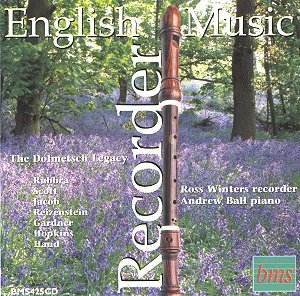There is a temptation to regard the modern repertoire
for recorder as something specialised outside 'proper' music. However
one only has to listen to a varied recital such as this to realise
that one does not have to be a recorder buff to appreciate such
music. This is a CD for all admirers of the composers featured,
while it is also an invaluable guide to all aspiring amateur performers
on how the music should go.
Those amateur recorder players who, like me, competed in local
music festivals in the past playing similar repertoire, will remember
the bird-like figure of Carl Dolmetsch in the adjudicator's chair,
with his clipped accent and demonstrations of how trills and mordents
should have been played. His concern was setting standards, even
if later his own high standards were eclipsed by a younger generation
of recorder virtuosos. Dolmetsch's annual Wigmore Hall recital
with the ever reliable Joseph Saxby at the harpsichord saw the
premieres of a long succession of commissions, some of which are
now recorded by Ross Winters on his excellent CD recital.
Perhaps the modern lynchpin of the recorder repertoire is Edmund
Rubbra's glorious Meditation Sopra 'Coeurs Désolés'
which in 1953 prompted Arthur Hutchings to a remarkable assessment,
which is so eloquent I think worth quoting here to underline the
stature of Rubbra's recorder music: 'I played it to two of my
colleagues. … one … said "How extraordinary that
something using only triads can be so charged with emotion".
The other said: "My God! It's no miniature. Its Rubbra himself
in the best grand manner. Once he begins 'in form' he screws me
up and I can't relax tension until the last note has stopped sounding".'
Carl Dolmetsch left us his own recorded recital of some of his
modern repertoire. Three of the pieces here recorded by Ross Winters
and Andrew Ball also appeared on Dolmetsch's 1973 LP recording
on the Californian Orion label (ORS 74144). The comparison brings
to light an immediate issue, that much of this repertoire, notably
all the Rubbra pieces and Gordon Jacob's Variations, were actually
written for harpsichord not piano accompaniment. To some extent
at least they need the sound of the harpsichord to make their
intended effect. In the case of the Rubbra Sonatina the printed
score just says 'harpsichord' with no alternative of piano. It
has to be said that it all works on the piano, but the impact
of the music is materially changed by the sound of the harpsichord,
and it is a pity it could not have been used here. Also there
is another Dolmetsch tradition Ross Winters has elected not to
emulate, which is Dolmetsch's practice of starting the last movement
of Rubbra's Sonatina on the sopranino recorder, switching instruments
after the first page.
Ross Winters is notably successful in this repertoire, with his
'fatter' sound than Dolmetsch, his better control of breath and
colour in the long sustained notes in for example 'Coeurs Désolés'.
With his more generous phrasing - adding half a minute to Dolmetsch's
timing of that piece - his performances firmly transfer the recorder
into the serious instrumental repertoire of the period.
This is an excellent selection of modern recorder music, and
it is particularly good to see Rubbra's three principal works
for recorder and keyboard brought together, making this CD a must
for Rubbra lovers at the very least. (Rubbra's 1978 Dolmetsch
commission, the Fantasia on a Chord, Op. 154, needs viola da gamba
and harpsichord, taking it outside the repertoire playable with
piano accompaniment.) Gordon Jacob's Variations of 1963 and Antony
Hopkins' Suite of 1953 were both also on the earlier Dolmetsch
LP but are here played with a poise and flowing phrasing which
Dolmetsch's more clipped manner of playing did not always achieve.
Later, in the early 1980s, Gordon Jacob was dazzled by the young
Michala Petri and wrote far more virtuosically for her. Here in
common with these composers he writes music which all amateur
recorder players can attempt but which needs a virtuoso to present
with the intonation and command of tone to give works such as
the Rubbra their true stature.
The pieces by Cyril Scott and Franz Reizenstein expand the vocabulary
of the recorder and are really flute music manqué. Indeed,
Scott's score indicates 'for treble recorder, flute or violin',
though to hear them played as here is to appreciate what atmospheric
contributions they are to the treble recorder's repertoire. The
Cyril Scott Aubade adopts a relatively low tessitura and it needs
careful projection of tone to enable the soloist to compete with
the piano. The Scott was once recorded by Karsten Behrmann on
a Da Camera Magna LP (sm 93502), but was played with less understanding
than by Ross Winters whose feeling for Scott's ebb and flow, adds
well over a minute to Behrmann's timing. Here Andrew Ball's sympathetic
piano playing does much to characterise the piece.
Although there is more very worthwhile recorder repertoire from
British composers of the 1930s-1950s, not least the Herbert Murrill
Sonata and the Malcolm Arnold Sonatina, this is a worthwhile and
representative selection. It includes several of the cornerstones
of the modern recorder repertoire. You do not need to be a recorder
player to enjoy it, but all recorder buffs will be fascinated
and inspired by hearing some of the pieces they grapple with played
in exemplary style.
Lewis Foreman
British
Music Society

![]() for
details
for
details